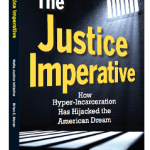Progressive Prison Project
Innocent Spouse & Children Project
Greenwich, Connecticut
The Ten Best Black Books of 2014, by Kam Williams: The Justice Imperative Makes “Honorable Mention.”
 We are pleased to announce that The Justice Imperative has received an
Honorable Mention on Kam Williams’ Top Ten Black Books of 2014 List.
Kam’s column is syndicated to over 100 newspapers & blogs around the
country. Thank you Kam & Thank you Babz! Babz Rawls Ivy & I
serve as Online Editors (blog & social media) for this important new
book, The Justice Imperative. Click image above for link to: thejusticeinitiative.org/blogs and to amazon.com to purchase your copy. – Jeff
We are pleased to announce that The Justice Imperative has received an
Honorable Mention on Kam Williams’ Top Ten Black Books of 2014 List.
Kam’s column is syndicated to over 100 newspapers & blogs around the
country. Thank you Kam & Thank you Babz! Babz Rawls Ivy & I
serve as Online Editors (blog & social media) for this important new
book, The Justice Imperative. Click image above for link to: thejusticeinitiative.org/blogs and to amazon.com to purchase your copy. – Jeff1. Justice While Black: Helping African-American Families Navigate
and Survive the Criminal Justice System
by Robbin Shipp, Esq. and Nick Chiles
2. An Obama’s Journey: My Odyssey of Self-Discovery across Three Cultures
by Mark Obama Ndesandjo
3. Who We Be: The Colorization of America
by Jeff Chang
4. Blessed Experiences: Genuinely Southern, Proudly Black
by Congressman James E. Clyburn (D-SC)
Foreword by Alfre Woodard
5. Life in Motion: An Unlikely Ballerina
by Misty Copeland
6. One Nation: What We Can All Do to Save America’s Future
by Dr. Ben Carson and Candy Carson
7. Finding Your Roots
by Henry Louis Gates, Jr.
8. What the Word Be: Why Black English Is the King’s (James) English
by Diane Proctor Reeder
9. Death of a King: The Real Story of Dr. Martin Luther King, Jr.’s Final Year
by Tavis Smiley
with David Ritz
10. Culture Worrier: Reflections on Race, Politics and Social Change
by Clarence Page
Honorable Mention
The Justice Imperative: How Hyper-Incarceration Has Hijacked the American Dream by Brian E. Moran, Esq.
Why Vegan is the New Black
by Deborrah Cooper
The Lawyer as Leader: How to Plant People and Grow Justice
by Dr. Artika R. Tyner
Just Mercy: A Story of Justice and Redemption
by Bryan Stevenson
Stokely: A Life
by Peniel E. Joseph
Brown Girl Dreaming
by Jacqueline Woodson
The Light of Truth: Writings of an Anti-Lynching Crusader
by Ida B. Wells
Edited with an Introduction and Notes by Mia Bay
General Editor: Dr. Henry Louis Gates, Jr.
The Rise
Creativity, the Gift of Failure, and the Search for Mastery
by Sarah Lewis
Success through Stillness: Meditation Made Simple
by Russell Simmons
The Imperfect Marriage
Help for Those Who Think It’s Over
by Darryl and Tracy Strawberry
Inside the Hotel Rwanda: The Surprising True Story… and Why It Matters Today
by Edouard Kayihura and Kerry Zukus
Handbook for an Unpredictable Life: How I Survived Sister Renata and My Crazy
Mother, and Still Came out Smiling (with Great Hair)
by Rosie Perez
The Global Obama: Crossroads of Leadership in the 21st Century
Edited by Dinesh Sharma and Uwe P. Gielen
Black and White: The Way I See It
by Richard Williams
Transforming Pain to Power: Unlock Your Unlimited Potential
by Daniel Beaty
Story/Time: The Life of an Idea
by Bill T. Jones
Place, Not Race: A New Vision of Opportunity in America
by Sheryll Cashin
Old School Adventures from Englewood–South Side of Chicago
by Elaine Hegwood Bowen
The Man from Essence
by Edward Lewis with Audrey Edwards
Foreword by Camille O. Cosby
Nine Lives of a Black Panther: A Story of Survival
by Wayne Pharr
Rainbow in the Cloud: The Wisdom and Spirit of Maya Angelou
by Maya Angelou
Cosby: His Life and Times
by Mark Whitaker
A Black Gambler’s World of Liquor, Vice and Presidential Politics: William
Thomas Scott of Illinois, 1839-1917
by Bruce L. Mouser
Foreword by Dr. Henry Louis Gates, Jr.
The Myth of Race, The Reality of Racism
by Mahmoud El-Kati
Our Ancestors, Our Stories
by Harris Bailey, Jr., Bernice Alexander Bennett, Ellen LeVonne Butler, Ethel Dailey, Vincent Sheppard and Dr. Orville Vernon Burton
Things I Should Have Told My Daughter: Lies, Lessons and Love Affairs
by Pearl Cleage
Yoga, Meditation and Spiritual Growth for the African-American Community
by Daya Devi-Doolin
How the Poor Can Save Capitalism: Rebuilding the Path to the Middle Class
by John Hope Bryant
Foreword by Ambassador Andrew Young
Not for Everyday Use: A Memoir
by Elizabeth Nunez
This Nonviolent Stuff’ll Get You Killed: How Guns Made the Civil Rights Movement Possible
by Charles E. Cobb, Jr.
America’s Music: Jazz in Newark
by Barbara Kukla
240 Ways to Close the Achievement Gap: Teachers Only Workbook (Vol. 2)
by M. Donnell Tenner, Joy Gay and Dr. Marti Dryk
Misdiagnosed: The Search for Dr. House
by Nika C. Beamon
Racial Innocence: Performing American Childhood from Slavery to Civil Rights
by Robin Bernstein
Guiou: The Other Blacks – The Afro-Jamaican Presence in Guatemala
by Gloria J. Arnold
Dollar Democracy: With Liberty and Justice for Some
by Peter Mathews
Pageants, Parlors & Pretty Women: Race and Beauty in the 20th Century South
by Blain Roberts
Unbreak My Heart: A Memoir
by Toni Braxton
Thirty-Three Days of Praise: Seeing the Good in Cancer
by Karrie Marchbanks
________
Rev. Jeff Grant, JD, M Div, Minister/Director
jgrant@prisonist.org
jg3074@columbia.edu
(o) +1203.769.1096
(m) +1203.339.5887
(m) +1203.339.5887
Lynn Springer, Advocate, Innocent Spouses & Children
lspringer@prisonist.org
(m) +1203.536.5508
George Bresnan, Advocate, Ex-Pats
gbresnan@prisonist.org
Michael Karaffa, Advocate, Disabilities
mkaraffa@prisonist.org
___________
Comments from Social Media: 



